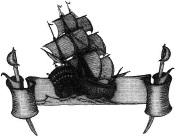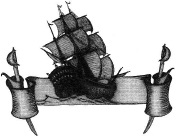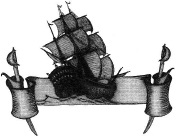Peter and the Shadow Thieves (13 page)
Read Peter and the Shadow Thieves Online
Authors: Dave Barry,Ridley Pearson
Tags: #Juvenile Fiction, #General, #Action & Adventure


ANYTHING UNUSUAL
“
W
HAT DID HE FIND?” said Ombra.
He and Captain Nerezza were taking lunch, seated across from each other at a heavy table in the captain’s darkened quarters. Nerezza detested these meals, because of Ombra’s bizarre dining habits.
Ombra ate only one thing: octopus. He ate it raw, and preferably live, out of a wooden bucket, placed on the table by a nervous cook’s mate, who quickly fled the cabin. Ombra would settle at the table and lean his black-cloaked form over the bucket, making hideous sucking and slurping sounds; occasional y black ink would squirt onto the table and floor.
Nerezza found it difficult to eat his own food, sitting across from this grotesque spectacle.
“What did who find?” said Nerezza.
Ombra made a sucking sound, and Nerezza saw a tentacle, stil writhing, disappear into the shadow beneath the hood.
“The boy you sent up to check the mizzen sails,” said Ombra. “What did he find?”
“Oh, him,” said Nerezza a bit smugly. “Nothing. As I expected.”
“Nothing? Nothing at al ?”
“Not in the sails, no.”
The hooded head lifted from the bucket, and although Nerezza could not see Ombra’s eyes, he felt the chil of his gaze.
“But he saw something?”
“He
thought
he saw something,” corrected Nerezza. “He lost his balance and blamed it on a bee.”
“A bee.”
“It’s ridiculous, of course,” said Nerezza. “There’s no bees out here. A gul is what he saw, if he saw anything. I took him off his ration of grog. He’s too young for grog if he’s seeing bees.”
Ombra slurped down another piece of octopus. Then his hood came up again.
“You wil double the watch tonight,” he said, sliding his chair back and standing.
Nerezza wanted to object. He didn’t appreciate doubling the watch; it would disrupt the shifts. But al he said was: “As you wish, Lord Ombra.”
“If any man sees anything unusual,” groaned Ombra, “I want to be told immediately.” He slid toward the door, passing uncomfortably close to Nerezza, who had to fight the urge to recoil.
“Yes, my lord,” said Nerezza, though what he thought was,
What are the men supposed to see? Bees
?
Ombra stopped, and Nerezza felt his gaze. “Possibly,” he said. And then he was gone.

THE SIGNAL
M
OLLY WAITED UNTIL THE MAID had set the tea service down and left the sitting room of their splendid London home. When the maid was out of earshot, Moly moved closer to her mother and spoke in a whisper.
“Have you heard from Father?” she said.
Louise Aster poured a cup of tea and handed it to her daughter before answering.
“No, dear, not yet.”
“Is that bad, do you think?” whispered Mol y. “Do you think he’s al right?”
“I’m sure he’s fine,” said her mother, pouring herself a cup. “He said it might be some time before he could get word to us.” Mol y, setting her teacup down, rose and walked to the window. The sitting room looked out on Kensington Palace Gardens, one of London’s finest streets, a broad boulevard lined on both sides with massive mansions. It was a typical y gloomy London day, though for once it was not raining. A carriage rumbled past, clots of mud flying off the wheels, puffs of breath steaming from the horses’ nostrils, the top-hatted driver hunched down into his overcoat, trying to keep warm.
On the sidewalk in front of the Aster house, looking cold but vigilant, stood the massive, sturdy form of Mr. Hodge. Mol y knew that Mr. Jarvis was watching the back of the house, with the dog, Hornblower. The third guard, Mr. Cadigan, was upstairs resting. Rain or no rain, there were always two of these men standing guard outside. Sometimes Mol y took them tea and biscuits, for which they were quite grateful, especial y Hornblower. Mol y had tried several times to engage the men in conversation, hoping to get them to talk about who, or what, they were watching for, or guarding against. These efforts had been fruitless: the men were polite, but revealed nothing.
“Oh, Mother…I hate to say it, but I miss Mrs. Bumbrake at times like this. She’s something of a comfort, in spite of herself.”
“Don’t worry, dear. As soon as her sister is feeling better, she’l be back. A fortnight at most.”
“I do hate this,” said Mol y.
“I’d rather you not use that word, dear,” said her mother. “It’s entirely unacceptable.” She continued, “Now, what is it you
dislike
?”
“This feeling of…of
waiting
,” said Mol y impatiently.
“Waiting for what?”
“For…for something bad to happen.”
“I’m sure nothing bad is going to happen.”
“Then why are there men guarding our house?” said Mol y.
Louise hesitated before she answered, and Mol y saw a flicker of emotion cross her usual y placid face. But al she said was, “We’re perfectly safe, dear. Those men are here because your father wanted to make sure of that.”
Mol y’s anger rose, and with it her voice. “Mother,” she said, “I’m not a child. I know what kind of people the Others are. I was on the ship with them, remember? I was captured by that awful man Slank. I’ve seen what they’l do to get the starst—”
Mol y stopped midword as her mother gave her an uncharacteristical y sharp look, fol owed by a barely perceptible nod toward the doorway. Mol y glanced in that direction and saw the maid standing there, just outside the room. She was the newest member of the household staff, a black-haired, rail-thin woman with a narrow face.
“Yes, Jenna?” asked Louise.
“Did you need anything else, ma’am?” said the maid.
“No, Jenna, thank you,” said Louise. “We’re fine.”
Jenna bowed and left. Louise rose from her chair and crossed to where Mol y was standing. Her expression was stil calm, but her cheeks had a pink tinge that Mol y knew meant she was angry.
“Mol y,” Louise said, her voice low but firm, “if you don’t wish to be treated like a child, you must not act like one. Yes, the Others are dangerous. Don’t you think I know that? But your father has done—is doing—al that he can to deal with the situation, and to protect us. For our part, we must be brave and do our best to maintain appearances. Above al , we must not discuss these matters—
ever
—in front of the staff.”
Mol y, chastened, nodded. “I’m sorry, Mother,” she said. “It’s just that sometimes I—”
She was interrupted by the resonating
bong
of the big front-door chime. She and her mother exchanged a
Who-could-that-be
? look. Their question was answered a moment later when Jenna reappeared in the doorway and said, “It’s Master George, ma’am. To see Miss Mol y.” Mol y blushed, drawing a smal smile from her mother.
“Please show him in, Jenna,” said Louise.
In a moment, the lanky form of George Darling gangled into the room, al arms and legs and ears, a sandy-blond fourteen-year-old who would one day be a tal and handsome man, but who was stil learning to operate his suddenly growing body.
“H…Hul o, Mrs. Aster,” he stammered to Louise.
“Hel o, George,” she said.
“Hul o, Mol y,” George said, his face, particularly his protruding ears, turning the shade of a ripe tomato.
“Hel o, George,” said Mol y.
“Mol y, why don’t you entertain George?” said Louise. “I need to speak to Cook about dinner.” With a twinkle in her eyes, she left the room.
“So,” said George, not quite looking at Mol y. “Hul o.”
“You said that already,” said Mol y.
“Ah,” said George. “So I did.”
George was a bit older than Mol y, but they’d known each other since they were very smal , as their families traveled in the same social circles. George’s home was in Ennismore Gardens, just across the park from Mol y’s. As children they had played together for many happy hours. Now, however, they were entering the awkward stage between childhood and adulthood, and although they stil enjoyed each other’s company, they were unsure how to, or whether to, express that enjoyment.
This had been particularly true in the months since Mol y had returned from her eventful trip to sea. George had sensed a change in Mol y; he had tried more than once to ask her about her experiences on the ship, only to have Mol y quickly change the subject. So he had given up on that line of inquiry. But he continued to cal on the Aster house regularly.
After a moment of uncomfortable silence, he said, “So, who’s the bruiser lurking out front? He gave me quite the hard look as I walked up.”
“That’s not a bruiser,” said Mol y. “That’s Mister Hodge.”
“Al right, then,” said George. “And who is Mister Hodge?”
“He’s a friend of my father’s.”
George studied her for a moment.
“Is your father here?” he said.
“No,” said Mol y. “He’s…he’s away.”
“I see,” said George. “And your father’s…
friend
…he stands outside al day?”
“Yes,” said Mol y. “He does.”
“I see,” he said.
Another uncomfortable silence, final y broken by George.
“Look, Mol y,” he said. “Do you…I mean, are you…I mean…is there something wrong?”
“Wrong? Of course not,” said Mol y. “What would be wrong? There’s nothing wrong.”
“Because if there is,” said George, “and if I could—”
“There’s nothing wrong,” said Mol y.
More silence.
“Al right,” said George. “I just thought that…I mean…Never mind.”
Mol y appeared on the verge of saying something, but she merely nodded. This was fol owed by more silence and increasing discomfort on both sides.
“Al right, then,” said George final y. “I suppose I should be going, then.”
Again Mol y appeared on the verge of saying something; again she held her tongue.
“Al right, then,” repeated George. “Good-bye, Mol y.”
“Good-bye,” she said, and they parted, both of them feeling quite unhappy, neither of them sure why.
Jenna showed George to the door, and Mol y went upstairs to her room, which was on the third floor at the front of the house, with a window looking out on the boulevard. Mol y sat in the window seat and watched George trudge away, not looking back. He passed a larger person coming up the sidewalk toward the Aster house. Mol y saw that it was a bobby—
a Metropolitan police officer—wearing the blue uniform and distinctive domed helmet. She noted that it was not Constable Calvin, the stout, red-faced, heavily whiskered man who had walked this beat since before Mol y was born, but a tal er man, hawk-nosed, clean-shaven, whose uniform seemed too smal for him, the frock-coat sleeves barely reaching his wrists.
As Mol y watched, the bobby drew alongside the corner of the Aster property, where he passed Mr. Hodge, who was beginning his hourly circuit of the perimeter of the Aster grounds. Mr. Hodge nodded politely. The bobby did not respond, and in fact barely glanced at Mr. Hodge. Mol y saw that this reaction, or lack of reaction, puzzled Mr. Hodge; he turned and watched the bobby’s back for a moment. Then he shrugged and turned right, heading around the side of the house.
And because he had gone around the side, Mr. Hodge did not see what the bobby did next, although Mol y, watching from her bedroom, did see it.
The bobby stopped in front of the house and looked in al directions, as if checking to see that nobody was watching him. Then he looked toward the Aster house, peering intently; Mol y figured he was looking toward the sitting room.
What is he looking at
? wondered Mol y.
What he was looking at, unseen by Mol y, was a hand, held close to the sitting-room window. The hand belonged to Jenna, the maid. It was holding up three fingers.
One for each guard.
From her window, Mol y thought she saw the bobby’s head give just the slightest hint of a nod, but she wasn’t sure. The bobby then turned and walked away in the same direction from which he had come.
I wonder what that was about,
thought Mol y.

